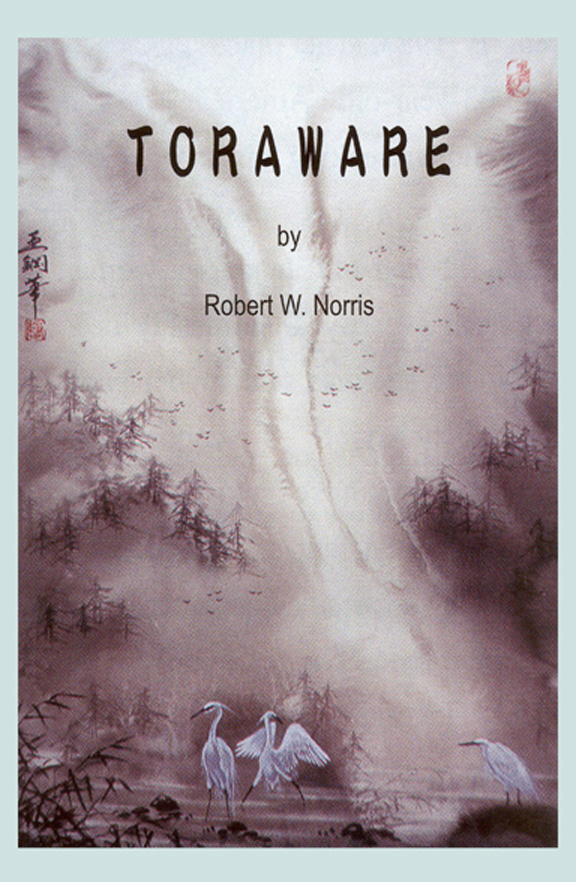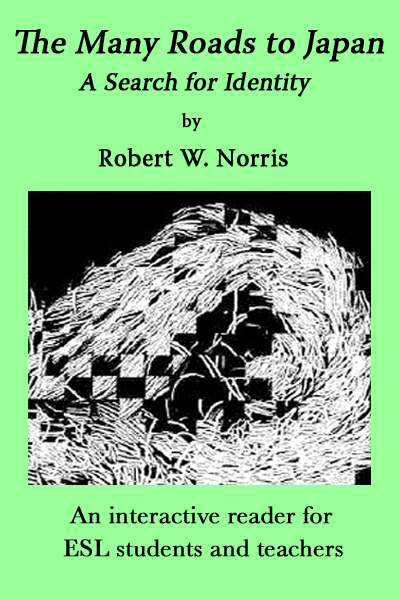
Home About Robert CV The Good Lord Willing and the Creek Don't Rise: Pentimento Memories of Mom and Me Novels Reviews ESL Papers (can be viewed online by clicking on titles) The Many Roads to Japan (free online version for ESL/EFL teachers and students) Contact     |
Robert's
Published Research Papers
1."Errors, Humor, Depth, and Correction in the Eisakubun Class." 1992. In Cross Currents Vol. 19, No. 2: 192-195. (A presentation of a simple and effective error-marking system for English composition classes.) 2. "Raising Japanese Students' Consciousness of English Article Usage: A Practical View." 1992. In Fukuoka Women's Junior College Studies Vol. 44: 95-104. (A presentation of a possible solution for helping students overcome their problems in acquiring a working knowledge of the English articles "a" and "the.") 3. "Using Creative Dictation to Manage, Motivate, and Activate Large Groups of False Beginners." 1993. In Fukuoka Women's Junior College Studies Vol. 45: 71-82. (New ways of using an old technique. In a teacher-fronted class, most students are passive learners, but creative use of dictation can involve the entire class in many ways.) 4. "Teaching Reduced Forms: An Aid for Improving Lower-Level Students' Listening Skills." 1993. In Fukuoka Women's Junior College Studies Vol. 46: 49-56. (An examination of what changes take place in native speaker speech, the effects of stress and non-stress, and useful ideas for improving "bottom-up" processing skills.) 5. "Keeping up with Native Speaker Speed: An Investigation of Reduced Forms and Deletions in Informal Spoken English." 1994. In Studies in Comparative Culture, No. 25: 72-79. (What reduced forms and deletions are, how they are formed, implications for teaching, and tips for improving students' listening skills.) 6. "Getting Students More Personally Involved: An Alternative to the Yakudoku- and Lecture- Dominated Methods of Teaching Literature and Reading." 1994. In Fukuoka Women's Junior College Studies Vol. 48: 25-38. (An examination of the deficiencies of word-by-word translation and lecture-dominated teaching methods; a summary of current research on ESL/EFL reading; and suggestions for improving the teaching of literature and reading in Japanese colleges.) 7. "Getting Students More Personally Involved in Their Reading and Literature Classes: A Case Study." 1995. In Fukuoka Women's Junior College Studies Vol. 49: 35-48. (A detailed look at the planning rationale, the actual teaching, and the results obtained in a class taught in the manner prescribed in the previous paper.) 8. "Teaching Reduced Forms: Putting the Horse before the Cart." 1995. In English Teaching Forum, Vol. 33: 47-50. (The importance of presenting reduced forms to the students and giving the students practice in "bottom-up" processing before requiring them to engage in higher-level listening practice.) 9. "Introducing Discussion Skills to Lower-Level Students: Can It be Done?" 1996. In Bulletin of Fukuoka Women's Junior College Vol. 51: 21-32. (An examination of some key characteristics of Japanese communicative style; a summary of the current state of Communicative Language Teaching research; and a description of a step-by-step approach to introduce discussion skills to lower-level students.) 10. "Introducing Discussion Skills to Lower-Level Students: Practical Lesson Plans." 1997. In Bulletin of Fukuoka Women's Junior College Vol. 52: 9-23. (Based on the approach outlined in the previous paper, a series of detailed lesson plans are given for teaching basic discussion skills to lower-level students.) 11. "Cued, Form-Focused Dialogues: A Systematic Approach to Active Discussions." 1997. In Kyushu Academic Society of English Language Education, No.25: 139-142. (A presentation of a step-by-step approach to introduce discussion skills to lower-level students. The emphasis is on practical activities to be used in the classroom.) 12. "An Easy-to-Use Writing Program and Error-Marking System." 1999. In Bulletin of Fukuoka International University No. 1: 41-48. (A revised, updated, and more detailed presentation of paper number 1 listed above.) 13. "Civilian Public Service Conscientious Objectors in World War II." 2000. In Studies in Comparative Culture, No. 49. (An historical background of conscientious objection in the U.S and how it led to the formation of the CPS; the religious backgrounds of the men in the CPS and where they came from; the kind of work they had to do and where they had to do it; some of the problems they faced; what happened to them after the war was over; and their influence on subsequent generations) 14. "Learning to Think Backwards: Japanese Students and the Acquisition of English Relative Clauses." 2000. In Bulletin of Fukuoka International University No. 4: 41-47. (This first paper of a two-part series examines specific structural differences between English and Japanese RCs, summarizes research that has been done on Japanese learners' acquisition and production of English RCs, and proposes that consciousness-raising (CR) and "noticing" activities provide the most effective classroom instruction for Japanese learners at the university level. An explanation of the rationale behind the use of CR activities and why they are suitable for Japanese learners is also included.) 15. "Teaching Relative Clauses to Japanese University Students: Practical Lesson Plans." 2001. In Bulletin of Fukuoka International University No. 6: 35-45. (Based on the premises outlined in the previous paper, a series of detailed lesson plans are given for teaching relative clauses to Japanese university students.) 16. "How Do We Overcome the Difficulties of Teaching Conditionals?" 2003. In Bulletin of Fukuoka International University No. 9: 39-50. (This paper examines the major difficulties inherent in the teaching and learning of English conditional sentences. Relevant research concerning the many types of conditionals, grammatical forms, semantic nuances, and frequency of usage is summarized, then followed by a proposed model for introducing "if" conditionals to ESL/EFL students.) 17. "Practical Lesson Plans for Teaching "If" Conditionals." 2003. In Bulletin of Fukuoka International University No. 10: 33-40. (Based on the earlier proposed model for introducing "if" conditionals to ESL/EFL students, this paper presents a variety of lesson plans for teaching these troublesome forms.) 18. "On the Difficulties of Classroom Management Faced
by Foreign Teachers at Japanese Universities."
2004. In Dai 52 Kai Kyuushu Chiku Daigaku Ippan
Kyouiku Kenkyuu Kyougikai Gijiroku (pp. 70-77). An
earlier version of paper number 19 listed below. 19. "Some Thoughts on Classroom Management Problems Faced by Foreign Teachers at Japanese Universities." 2004. In Bulletin of Fukuoka International University No. 12: 23-30. (This paper examines examples of Japanese university student classroom behavior that often irritate foreign teachers, the characteristics of Japanese communicative style, and the role of the university in Japanese society. It concludes by suggesting some ways that foreign teachers can, in order to promote active learning, adapt their own cultural expectations in order to accommodate and take advantage of the expectations of their students. An extended and revised version of paper number 18 listed above.) 20. "Dealing with Plagiarism at a
Japanese University: A Foreign Teacher's Perspective."
[PDF link] 2007. The East Asian Learner, Vol. 3,
No. 1: 1-20. (The first section of the paper covers my
experiences and difficulties in coping with an
increasing amount of plagiarism in my classes conducted
in Japanese. The next section summarizes the research I
did on the definition of plagiarism, on the question of
cultural influences, and on reasons students plagiarize.
The following section reviews recommendations and
measures that schools and researchers in the West are
trying to implement to combat the problem. The purpose
is to look for possible implications for the situation
in Japan. The final section discusses the results of my
reflective practice.) 21. "A Foreign Teacher's Thoughts on Plagiarism at a
Japanese University." 2007. In Bulletin of Fukuoka
International University No. 18: 1-12. (A modified
version of paper number 20 listed above.) 22. "A Comparison of
American GI Resistance to the Vietnam War and the Iraq
War." 2008. In Bulletin of Fukuoka
International University No. 20: 1-15. (This paper
makes a comparison of GI resistance to the Vietnam War
and the Iraq War. The first section examines the makeup
of the military in the two wars. The following sections
divide resisters into two types (disobedients and
dissidents) and examines the types of resistance they
have engaged in.) 23. "Introducing
Discussion Skills to Japanese University Students
Revisited (1): A Life Skills Education Perspective."
2014. In Bulletin of Fukuoka International
University No. 32: 1-16. (This paper examines
Fukuoka International University's (FIU) implementation
of a life skills education policy and its implications
for practical application in an English classroom. The
paper is divided into four parts. Part 1 discusses FIU's
Life Skills Education Policy; part 2 reviews the
research I did and recommendations I made in a two-part
series on teaching discussion skills in the 1990s; part
3 is a summary of relevant researcch related to the
teaching of crditical thinking and discussion skills in
Japan; and part 4 covers the rationale for the revision
of my teaching approach for a discussion skills class in
order to follow the new Life Skills Education Policy. It
also includes some introductory lesson plans for
teaching discussion skills.) 24. "Introducing
Discussion Skills to Japanese University Students
Revisited (2): More Practical Lessons." 2015. In Bulletin
of Fukuoka International University No. 33: 1-14.
(Based on the ideas for implementing critical thinking
elements into an English discussion skills class at a
Japanese university outlined in the previous paper, this
paper provides some comprehensive lesson plans for
teaching basic discussion skills.) Copyright (c) 2022 Robert W. Norris. All Rights Reserved |